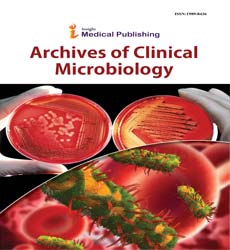Abstract
Aflatoxin M1 levels in lactating mothers in two Nigerian cities
Background: In Nigeria, there is paucity of information on exposure to aflatoxin by lactating women and children. Aflatoxin (AFs) are potent carcinogens that are produced as secondary metabolites of strains of Aspergillus parasiticus and Aspergillus flavus that grow on important food crops such as groundnuts, maize and other oilseeds .Present study reports on the aflatoxin exposure of lactating women in two cities in Southwest Nigeria.Methods and Findings: One hundred and twenty samples of human breast milk were collected into universal plastic bottles by self-expression from women attending immunization clinic. The samples were collected into iced cooler and stored at 40C within 24hours before extraction and were screened for Aflatoxin M1(AFM1) using immunoaffinity column and High performance Liquid Chromatography with fluorescence detection. Aflatoxin M1 was detected in 17 samples of human breast milk (14.1%). Range for AFM1 was between 2-187ng/ml. T-test using SSPP version 14.0 at 95% confidence interval of difference gave a value of 0.332 AFM1. Main diets of Nigerians include maize, cassava, yam, melon, groundnuts, wheat, and bread.Conclusions: The findings therefore support the possibility of dietary recommendations to women, during pregnancy and lactation, aimed to tentatively reduce the aflatoxins contamination of human milk. AFM1 contamination of breast milk was not frequent (14.1%), however some positive samples can cause toxicological effects. Finding suggests need for urgent attention to the possible public health implications.
Author(s): Flora T Oluwafemi
Abstract | Full-Text | PDF
Share this

Abstracted/Indexed in
- Google Scholar
- Open J Gate
- Genamics JournalSeek
- The Global Impact Factor (GIF)
- Open Archive Initiative
- China National Knowledge Infrastructure (CNKI)
- Scimago
- Directory of Research Journal Indexing (DRJI)
- WorldCat
- Proquest Summons
- Publons
- MIAR
- ResearchGate
- University Grants Commission
- Geneva Foundation for Medical Education and Research
- Secret Search Engine Labs
Open Access Journals
- Aquaculture & Veterinary Science
- Chemistry & Chemical Sciences
- Clinical Sciences
- Engineering
- General Science
- Genetics & Molecular Biology
- Health Care & Nursing
- Immunology & Microbiology
- Materials Science
- Mathematics & Physics
- Medical Sciences
- Neurology & Psychiatry
- Oncology & Cancer Science
- Pharmaceutical Sciences

